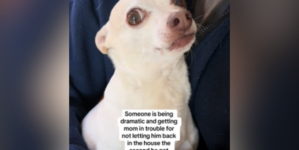-
Fitness influencer dies 3 months after being shot in robbery attempt - 21 mins ago
-
Commanders Shockingly Snap Eagles’ 10 Game Winning Streak - 23 mins ago
-
Trump Previews Second Term in Sprawling Speech to Conservative Conference - 27 mins ago
-
Tears at Reason Behind Rescue Dog’s Dramatic Reaction To Being Left Outside - 58 mins ago
-
From the Surf to the Sermon: The Christian Surfers of Costa Rica - about 1 hour ago
-
Who Is Stephen Miran? What Trump Adviser Pick Has Said About the Economy - 2 hours ago
-
These Spiritual Democrats Urge Their Party to Take a Leap of Faith - 2 hours ago
-
Matt Gaetz Ethics Committee Report: What to Expect in Monday’s Release - 2 hours ago
-
Visitors to Riverside’s Festival of Lights warned of parking scam - 2 hours ago
-
Letter Calling for Tracking People of Color Circulates in an Oregon County - 3 hours ago
She Was 8 Weeks Pregnant and Out of Options. She Called Me for Help
It’s early May, and M. calls from a state in the Southeast that just banned abortion after six weeks. M. tells me she is eight weeks pregnant, and I can hear the nervousness and fear in her voice. She’s a West Indian woman in her late twenties. M. says she cannot afford the cost of an abortion on top of the cost of traveling to New York City.
“I can only stay for two days,” she says. “I have children to take care of back home.”
I work at the NYC Health Department’s Abortion Access Hub. Launched a few months after the Supreme Court’s 2022 Dobbs v. Jackson decision that overturned Roe v. Wade, which allowed states to ban or restrict abortion, we provide confidential help finding an abortion provider here in New York City.
Women like M., ranging from their teens to their 40s call us every day, speaking languages such as Spanish, Haitian Creole, Ukrainian, Mandarin, and many more. We help people find appointments, secure financial assistance, and find transportation and lodging. We can provide a referral regardless of whether the caller lives in New York City, and regardless of their immigration status.
Though based in NYC, we receive a significant influx of calls from states like Florida, where abortion is heavily restricted, and Texas, which imposes strict bans. As a result, we’ve become first responders to a growing public health need for accessible abortion care.
When states make abortion inaccessible, what they’re really doing is outsourcing it. People don’t stop needing abortion care with the stroke of a pen. Forcing people to travel hundreds if not thousands of miles for essential health care only makes abortion more burdensome.
The financial cost alone is punishing. A lot of callers don’t have money or resources to bring another child into the world. Most cannot even afford the abortion, even if they have health insurance—some policies don’t cover abortion.

Jazmin Gil Marquez
Some callers are on their parents’ insurance and can’t risk disclosing their care. On top of that, they often face travel expenses, lost wages from time off work, and the need for childcare, which are all barriers to accessing essential care that should be available in their own communities.
I witness every day the toll that misinformation and lack of information take on people. When you search online, a million things come up. Anti-abortion organizations flood the Google search zone, spreading lies about abortion care and even birth control.
Callers frequently have incorrect information or don’t understand the differences between medication and procedural abortion. Limiting abortion access means limiting basic health care, leaving people to navigate an often-overwhelming maze on their own. Callers look to us to provide reliable information.
I remember a Spanish-speaking caller who told me she thought she had taken “abortion medication” and it “didn’t work”—she was still pregnant. I connected her to a provider, who discovered she hadn’t taken an abortion pill, she’d taken Plan B—an emergency contraceptive to be taken the morning after unprotected sex—at 6 weeks. That’s what we’re here for: to connect callers like her to providers of safe and effective care.
One of the biggest burdens is the shame, confusion, and stress many callers feel. You can hear in their voices that they are desperate for help. After I’ve connected callers to an NYC provider and a source of financial assistance, I can hear the relief in their voices. It feels deeply rewarding to let someone in distress know there is help and hope.
It takes courage to work for the Hub, fielding calls from countless people in brutal circumstances. But I have a really supportive team, and we’re able to share information and stories. Because of them, I can respond better and remain calm. They are what make the Hub a safe haven for anyone who may feel there’s no one else they can rely on. That there’s no one else who can tell them it’s going to be ok.
To the leaders of states who have banned or restricted abortion care, I can only say that this is being done to your families and your communities because of you. People who can least afford to are travelling for days, hundreds of miles, under immense stress. Why would you put anyone through this? I know because I speak to them nearly every day, and I hear the enormous pain you’re inflicting on your own neighbors, coworkers, and loved ones.
Jazmin Gil Marquez is an Abortion Access Hub Navigator in New York City.
All views expressed are the author’s own.
Do you have a unique experience or personal story to share? See our Reader Submissions Guide and then email the My Turn team at myturn@newsweek.com.
Source link




















